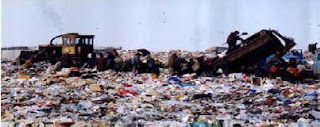
In the last few years the problem of nuclear and chemical waste in Kazakhstan has increased on a world scale. In addition, there is a new problem – that of solid domestic waste. Mountains of non-treated refuse are poisoning its cities year on year, exuding a saprogenic stench and turning them into hideous sights.
For years local officials in Almaty have tried to solve the problem of how to utilize solid domestic waste. But in spite of these efforts, more than 700 tons of untreated refuse are taken from Almaty each day to a special range nearby. This problem is urgent, despite the reassurances of local officials that the range is only 14% full. Official data shows that each year this 'refuse city' is growing by 305,000 tons – and a simple sum show that in five years it will reach 1525,000 tons. In 10 years time the range will be transformed into a three million ton refuse mountain. Not a gift for posterity! Refuse processing plants are urgently needed in the size of city-megapolis found in Kazakhstan. Talks have been going on for a long time, but have led nowhere.
So far none of the proposals made are likely to succeed. This is strange, because many people would like to settle the problem. This year the Association of Enterprises for the processing of solid domestic wastes and many other private firms have presented projects for the Management of Environment Protection to consider. At the moment an Italian project, Balapress, has aroused the greatest interest among ecologists.
One line of this project comes to US$630,000. The productivity of processing is 20 tons per hour. This is hard to undervalue. It means that 700 tons of refuse that are produced daily could be processed by the machine in 35 hours. Two lines of Bala-press are able to process the same amount in 17 hours. So it is strange that the government cannot find $1,260,000 to buy the equipment that would solve the refuse problem.
We decided to discover the position of the municipality (akimat). So we sent an official inquiry to Mr. Viktor Khrapunov, the mayor (akim) of Almaty city. The akimat's opinion was that the utilization of solid domestic wastes is indeed urgent for the city. To help solve the problem, it is planning this year to give 54 million tenge (about $350,000) from the state budget. But it has refused to fund the building of the refuse processing plant from the national treasury due to the cost. It believes that a private commercial organization could solve the problem much faster, since waste utilization should be directed at a future processing industry. But it is no secret that the costs of buying equipment are high and the project may not therefore be profitable.
The akimat considers that building a processing plant for secondary refuse treatment is not profitable, though experience elsewhere in the world shows the opposite. Refuse processing and secondary production form profitable, stable business in the United States – for example, 77% and 85% of domestic wastes are used as a secondary source in Seattle and New York respectively. In Karaganda city (Kazakhstan) the benefit that can be derived from a garbage-can has been assessed, and the building of a new enterprise for the production of equipment for refuse processing has been started. 'Hydromex process' technology will be used at the plant. That will make it possible to convert all types of wastes without preliminary separation, including the heaviest ones: polyethylene, wastes of tyre production, wastes from the carpet industry and sewerage system. Experts estimate that the new enterprise will provide jobs for 3,500 of Karaganda's inhabitants, with a minimum salary of 30,000 tenge.
No comments:
Post a Comment